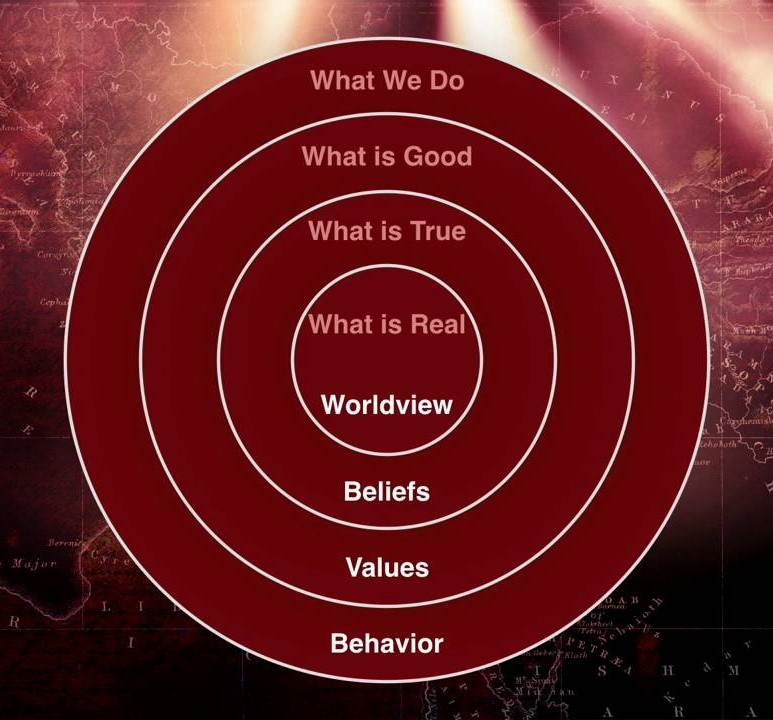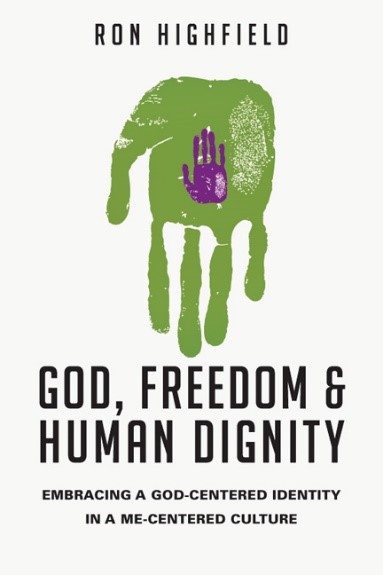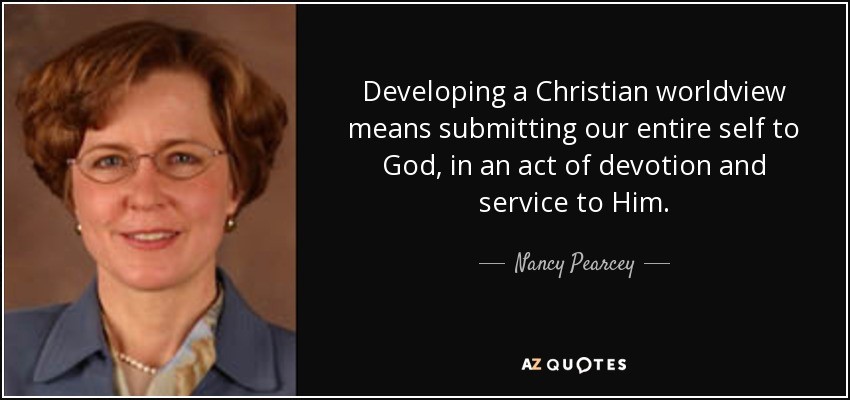By Ted Johnston, GCI Publications Editor

As Greg Williams mentions in his letter, with this issue of Equipper, we’ve begun a series examining the related topics of worldview conversion and whole-life discipleship. In this article I’ll help lay the foundation for the series by addressing what worldview is and why it matters a great deal.
Stated simply, a worldview is a person’s view of the world. It’s how they see (interpret) reality. Each of us (whether we know it or not) has a worldview, and as shown in the diagram below, it powerfully affects how we think, feel and live. Our worldview is thus of great importance, not only to us personally, but to the people we influence and, ultimately, to the whole of creation.

Our worldview largely determines how we view all sorts of issues: God, politics, truth, education, abortion, marriage, the environment, race, gender, economics, what it means to be human, the origins of the universe… to name just a few. That being the case, the related questions for us as followers of Jesus are these:
- Am I aware of the worldview I currently hold?
- Does it align with Jesus’ beliefs, values and perspectives?
- If not, how can I see my worldview converted (transformed) to become more fully Christ-centered?
These questions are not answered quickly—time and clear-eyed introspection are needed. Hopefully this series on worldview conversion here in Equipper will assist you and equip you to assist others.
Ethics and personal identity
 In God, Freedom & Human Dignity: Embracing a God-Centered Identity in a Me-Centered Culture, Ron Highfield (professor of religion at Pepperdine University) notes the debates raging within and without Christian circles concerning questions related to ethics: How should we live? On what do we base our answers? Highfield notes that the trinitarian, Christo-logic of the gospel answers these questions by pointing to the related topic of identity. Why identity? Because that is where Scripture takes us, in line with the truth that we humans tend to live in alignment with our sense of personal identity.
In God, Freedom & Human Dignity: Embracing a God-Centered Identity in a Me-Centered Culture, Ron Highfield (professor of religion at Pepperdine University) notes the debates raging within and without Christian circles concerning questions related to ethics: How should we live? On what do we base our answers? Highfield notes that the trinitarian, Christo-logic of the gospel answers these questions by pointing to the related topic of identity. Why identity? Because that is where Scripture takes us, in line with the truth that we humans tend to live in alignment with our sense of personal identity.
Embracing a God-centered identity
The gospel declares that our God-given identity is found not within ourselves, but in Jesus, in whom divinity and humanity are permanently united in one Person. As we, by the Holy Spirit, embrace our true identity in Christ, we are set free from the bondage created by embracing the me-centered identity (with its worldview) that is dominant in most of the Western world.

Many people today (including some Christians), bristle at the idea that their true identity is to be found outside themselves—especially when you tell them its location is in the humanity of Jesus. Why? Because most people think God has an agenda to deny them freedom and thus personal dignity. They see God as a rigid, perhaps grumpy parent who wants his children under strict control. But that is not the nature of the God revealed to us in Jesus. Jesus says that to know him is to know the Father (John 14:9) and that to follow him is not to lose our freedom but to gain it (John 8:36).
Jesus brings us true freedom by sharing with us his humanity (which is true humanity). Highfield comments:
Christ pioneered the way to truly human life in which human beings achieve their deepest potential for freedom…. In Christ we find an identity rooted not in others’ changing thoughts about us but in God’s eternal knowledge of us. Through the Spirit, God enables us to achieve the perfect freedom of life in harmony with our truest identity. (pp. 13, 14)
Rejecting a me-centered identity
The Holy Spirit leads us to seek and embrace our true, God-given identity in Jesus Christ. But doing so inevitably brings us up against the secular worldview of our me-centered age. Highfield comments:
Modern culture denies that one can become an authentic person or experience fulfillment in life by conforming to natural or socially given relationships and roles. Instead we are taught that our self-worth and happiness depend on reconstructing ourselves according to our desires. (p. 17)
In the first chapter of his book, Highfield sketches out the historical journey through which a me-centered conception of personal identify arose and became dominant within Western culture. He examines the thoughts of Plato, Aristotle, Augustine, Descartes, Locke, Rousseau and others—ideas and ideals that have profoundly shaped the secular, me-centered worldview that now dominates in the Western world. A key element in that worldview is the issue of freewill (self-determinism). As Descartes wrote, “Nothing but freewill can produce our greatest contentment.” In step with that worldview, we moderns want to be able to remake ourselves in any way we choose.
With this ideology fully in place via the Enlightenment, “the stage was set for declaring God completely unnecessary for living a flourishing human life” (p. 28). Over time, this thinking largely prevailed, and individualism and self-determinism won the day. Highfield summarizes:
The modern self is me-centered. Most people are not self-centered in the crass sense of being selfish or narcissistic; nevertheless they locate all values and sources of fulfillment within the self, in its feelings, preferences, thoughts, opinions and wishes. Even when they cannot articulate it this way, they ground the respect they feel for others in such inward qualities as autonomy, inner desires and unique inner depth that requires expression. [To them] it would seem odd to ground respect for others in something extrinsic, such as divine creation or divine love or a divine command. Withholding respect from others because of their choices or desires or ways of self-expression strikes our contemporaries as irrational and hateful. (p. 31)
As a result of this secular worldview, contemporary society has largely lost an ability to meaningfully discuss moral-ethical issues. What passes for rational debate in Western culture often is nothing more than the assertion of personal preferences with no grounding in a realization of the essential elements of human nature and its ultimate goal and purpose (end, or telos). Those who seek to ground such discussions in a Christ-centered worldview are definitely “swimming upstream” against the strong current of a modern, me-centered view of human identity. Highfield comments:
The current moral culture was founded on rejection of the traditional claim that human beings are given their essence and end [telos] by God… Many of our contemporaries exhibit a viscerally negative reaction to assertions of authority, pretense of objectivity or arguments to truth in the moral sphere…. To many people, Christian calls for obedience to the divine law, for repentance and moral transformation sound like recipes for oppression. (p. 38)
Me-centered reactions to God
According to Highfield, the secular Western world of our day tends to react to God (or the idea of God) in one of three ways:
1. Defiance: a reaction grounded in the idea that God and humanity are competitors. This reaction reflects the defiant individualism and self-determinism represented in the poem Invictus by William Ernest Henley, which concludes with this stanza:
It matters not how strait the gate,
How charged with punishments the scroll,
I am the master of my fate:
I am the captain of my soul.2. Subservience: a reaction Highfield calls “default religion.” This reaction involves seeking to give God his due in order to avoid his wrath and secure his favor. Though doing so might feel like serving God, this reaction takes people in a direction that badly misrepresents the nature of God and never brings about the true freedom it seeks. Why? Because it substitutes religion for God, and in that way is idolatrous. The truth of the gospel is that true religion—defined as loving God and loving people—is not about religious subservience, which has to do with self-effort, but about the freedom that comes through true religion, which is a gift from God made available to us in and through Jesus, by the Holy Spirit.
3. Indifference: a reaction that includes atheism, though it is not limited to it. Indifference involves various strategies by which people “immerse themselves in the practical affairs of life, in pleasure seeking or in maintaining an illusory identity” (p. 64).
Our sense of self
Whether the reaction to God is defiance, subservience or indifference, it’s a sad fact that in seeking freedom and dignity for themselves, many (if not most) moderns in the West define the self apart from its relationships with other humans and with the triune God who created us for relationship. In doing so, they ground their sense of worth (and thus their dignity) in all sorts of things. But the reality, which is revealed to us in Holy Scripture, is that our true worth as humans is found in one place only—the love the triune God has for us all. Highfield comments:
We know that God loves us no less than God loves himself, because God does not love us for what we are. God’s love for us is grounded in the Father’s love for the Son…. By loving us with the love of God, God bestows on us the highest dignity conceivable and frees us for the most perfect freedom possible. (pp. 205, 206)
Through the incarnation of the Son of God and by the ministry of the Holy Spirit, our humanity is united to God in the most intimate way. Rather than diminishing our personhood, that union establishes it, for in Jesus Christ we are united both with God and with all people. This union is the source of our true humanity, and thus of our personal freedom and dignity.
We see this personal (“personalizing”) freedom and dignity in the Holy Trinity in which the Father, Son and Holy Spirit find their identity as Persons in the love they share for one another. The same is true for God’s design for humans for we are created in God’s image. God does not define love as independent of others—his love is other-centered. Jesus therefore calls on us to see our neighbor’s good as our own (“love your neighbor as yourself,” he said). As Highfield notes, “The ideal implicit even in human love is a union between persons that rules out competition without erasing distinction” (p. 209).
On this side of glorification, we do not love perfectly. Despite our faith, we still compete, even with the ones we love the most. So how then should we live in the midst of our brokenness on this side of glory? The answer is that we live with, in and through our Lord Jesus, by the Holy Spirit. This is the life of faith, hope and love (1 Cor. 13:13): In faith, we trust in and rely on the perfection of Jesus (including his perfect, glorified humanity). In hope we look forward to the perfection we will one day experience with Christ in a new heaven and new earth. And we receive from God his love by which we love God and other people. In Christ and by the Spirit, we are set free to love and to be loved—free to share in God’s love for all people, ourselves included.
This love is not ours by merely mimicking Jesus. We don’t “love like Jesus loves” in ways that are somehow disconnected from Jesus himself. Instead, we love with, in and through him, by the Spirit. This means that we love others with the love by which God, in Jesus and by the Spirit, is loving us and loving them. Jesus is the source—the fount—and by the Spirit he freely shares with us his perfect, other-centered love for God and for all people. Our true humanity (identity and dignity) is found not in ourselves, but in (and with) him. Highfield concludes his book with this statement:
God is so much for us and we are made so much for God that only by returning ourselves to God utterly may we become truly ourselves and live life to the full. In loving God for God’s sake alone we will find genuine freedom, and in allowing ourselves to be loved by God we will discover our true dignity. (p. 217)
Conclusion
Enlightened by God’s Word and Spirit, we are able to discern that the secular worldview that now dominates much of the Western world is nothing but an illusion—a failed attempt to be like God. We also are able to discern that a Christ-centered worldview is grounded in the reality that the eternal Son of God, in the person of Jesus, has entered into the human condition, has overcome our fallenness, and opened to us the possibility to be who we truly are in him—our true selves, beloved children of God.
As this series of Equipper articles on the topic of worldview conversion unfolds, we’ll examine more closely the distinctions between a secular and a Christ-centered worldview. We’ll also examine various ethical issues, not merely to gain knowledge, but so that we can minister within the world in ways that are real participation in the disciple-making work that Jesus, by the Holy Spirit, is now doing.
Suggested resources
If you would like to learn more about worldview, worldview conversion, Christian ethics and whole-life discipleship, we suggest these resources:
- For a detailed summary of Ron Highfield’s book, click here to begin reading a series of articles by Ted Johnston on The Surprising God blog.
- For a short video titled “What is a Worldview,” click here.
- For a short video titled, “What’s Your Worldview,” click here.
- For a video of a Veritas lecture on worldview by Dallas Willard, click here.
- For a series of Thrive studies for teens on the topic of worldview click here.



Great introduction! We must courageously engage with culture and with the honest desire to seek and uphold truth. At the same time, the manner of our discussions ought to reflect always the love of Jesus. Truth without love can be just as harmful as love without truth.
Hi Ted. I appreciate the information you are giving us on an important subject. If you have not already done so, may I suggest you read the latest Apostolic Exhortation from Pope Francis: “On the Call to Holiness In Today’s World.” I find his writings always thought provoking and easily understandable. His final paragraph: “It is my hope that these pages [107 in my copy] will prove helpful by enabling the whole Church to devote herself anew to promoting the desire for holiness. Let us ask the Holy Spirit to pour out upon us a fervent longing to be saints for God’s greater glory, and let us encourage one another in this effort. In this way, we will share a happiness that the world will not be able to take from us.”
Thanks for the recommendation Jim.
very helpful , thanks a lot. We watched the Truth project by Focus on the family, which is alo enlightening
Great to read this material, very helpful, we watched the Truth Project by Focus on the family about a christian worldview, so this is very interesting too.
Thank you Ted.